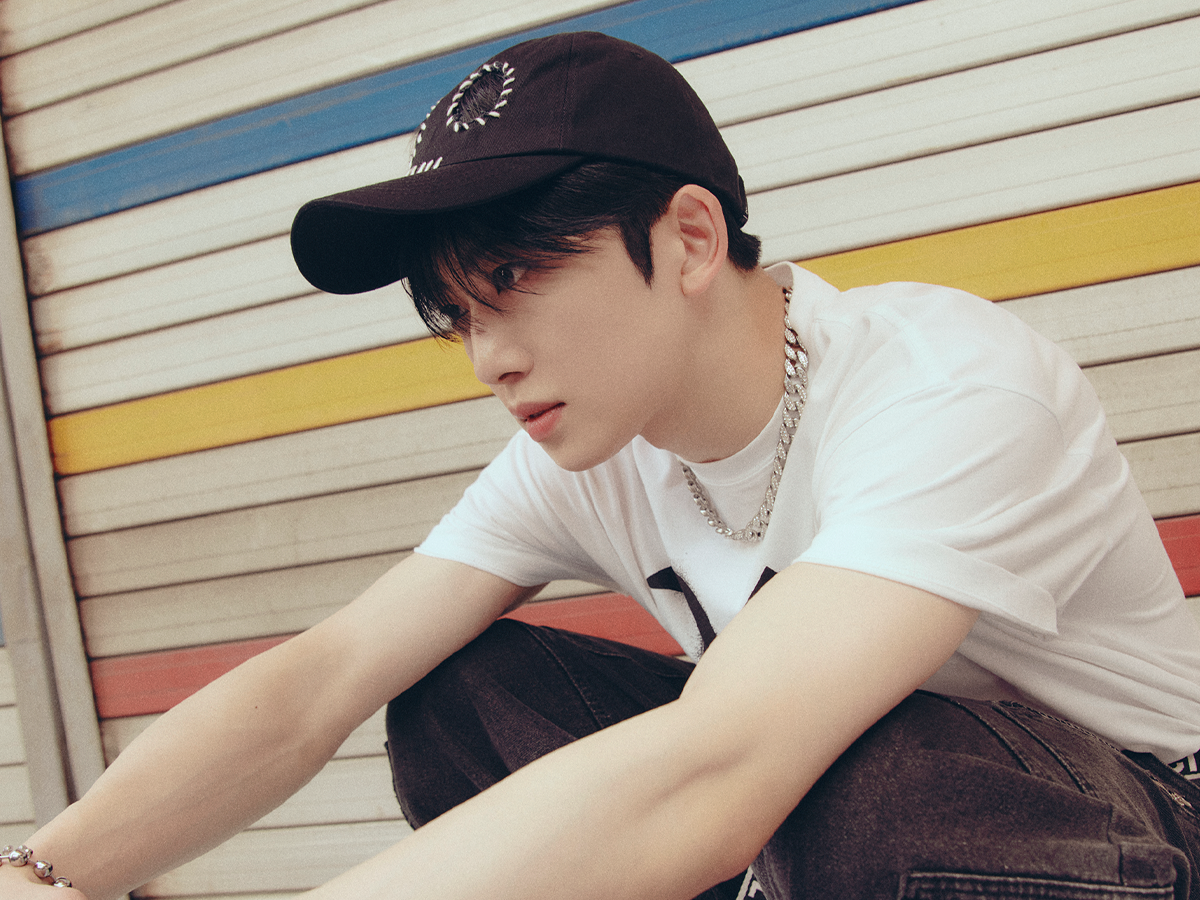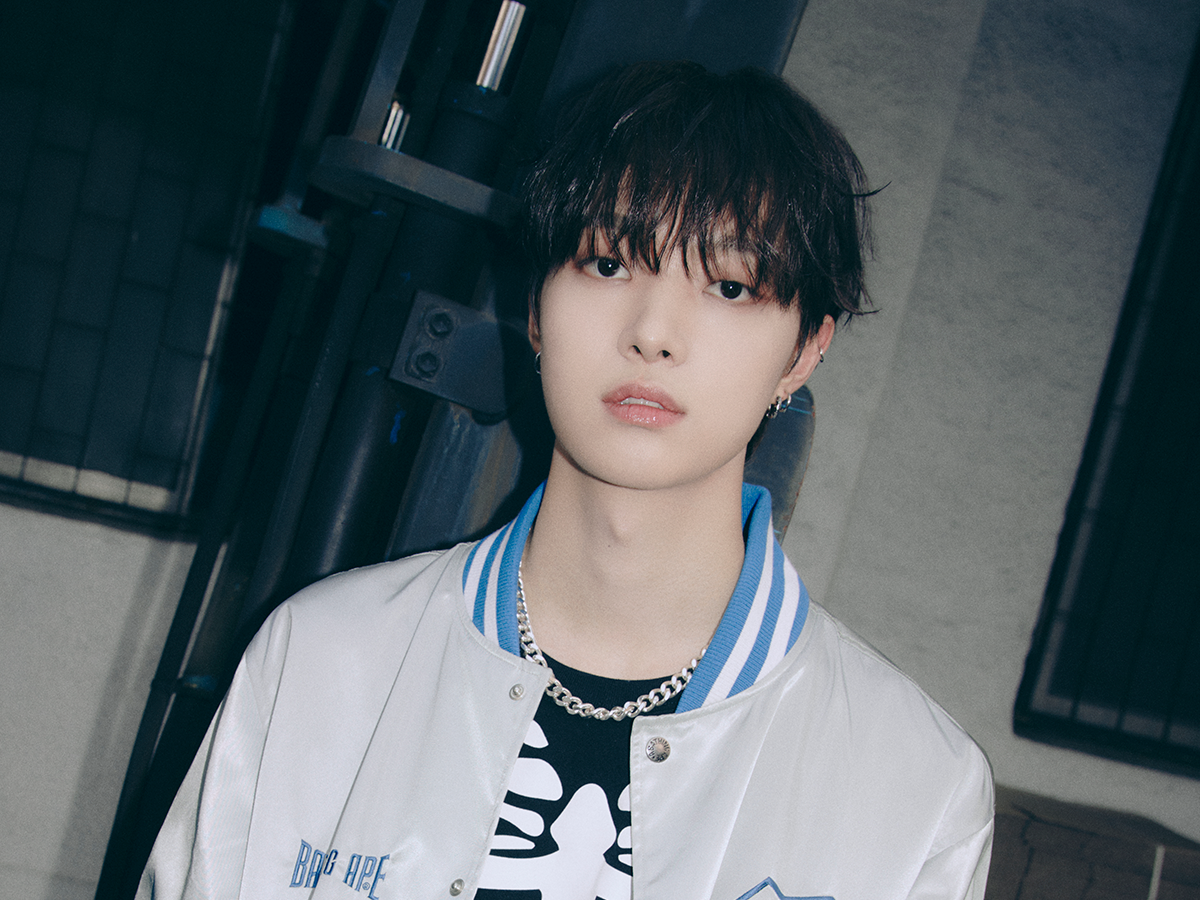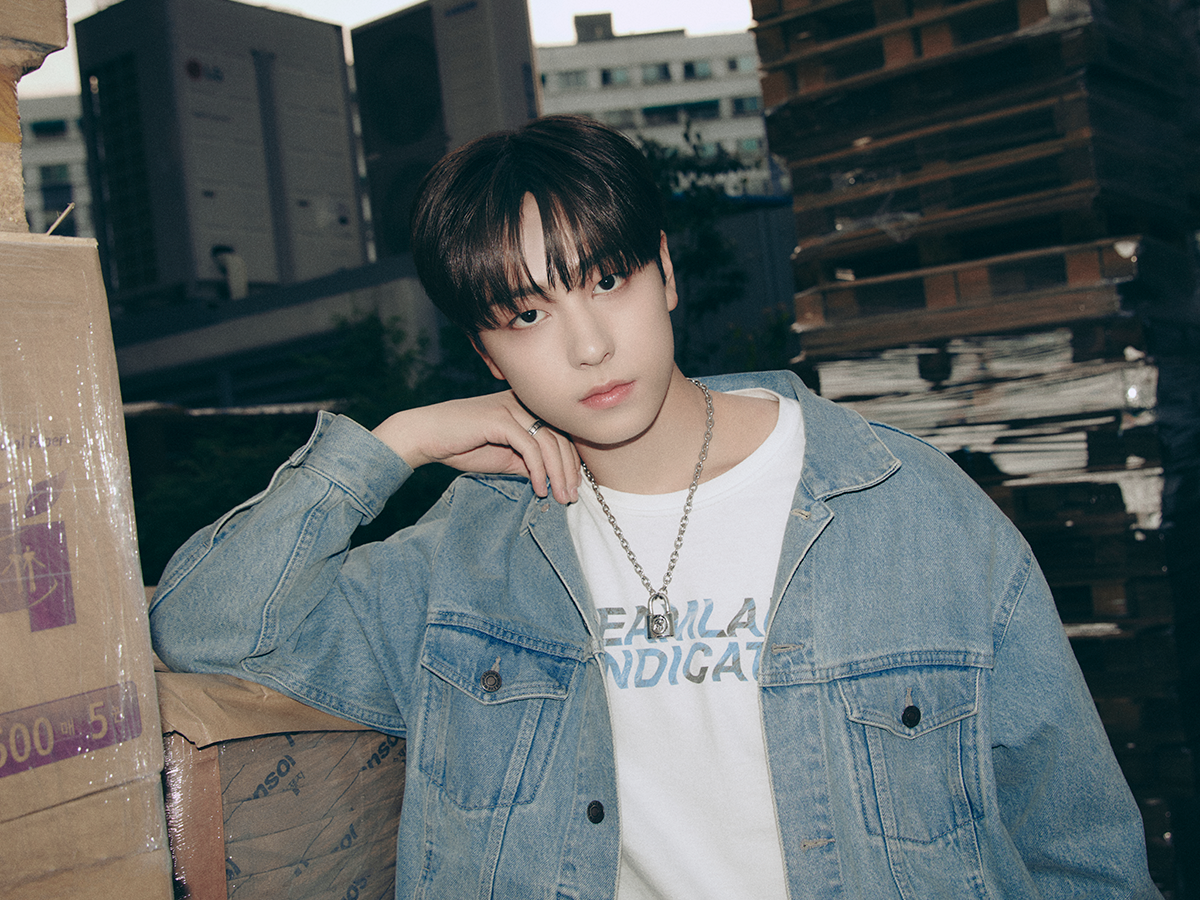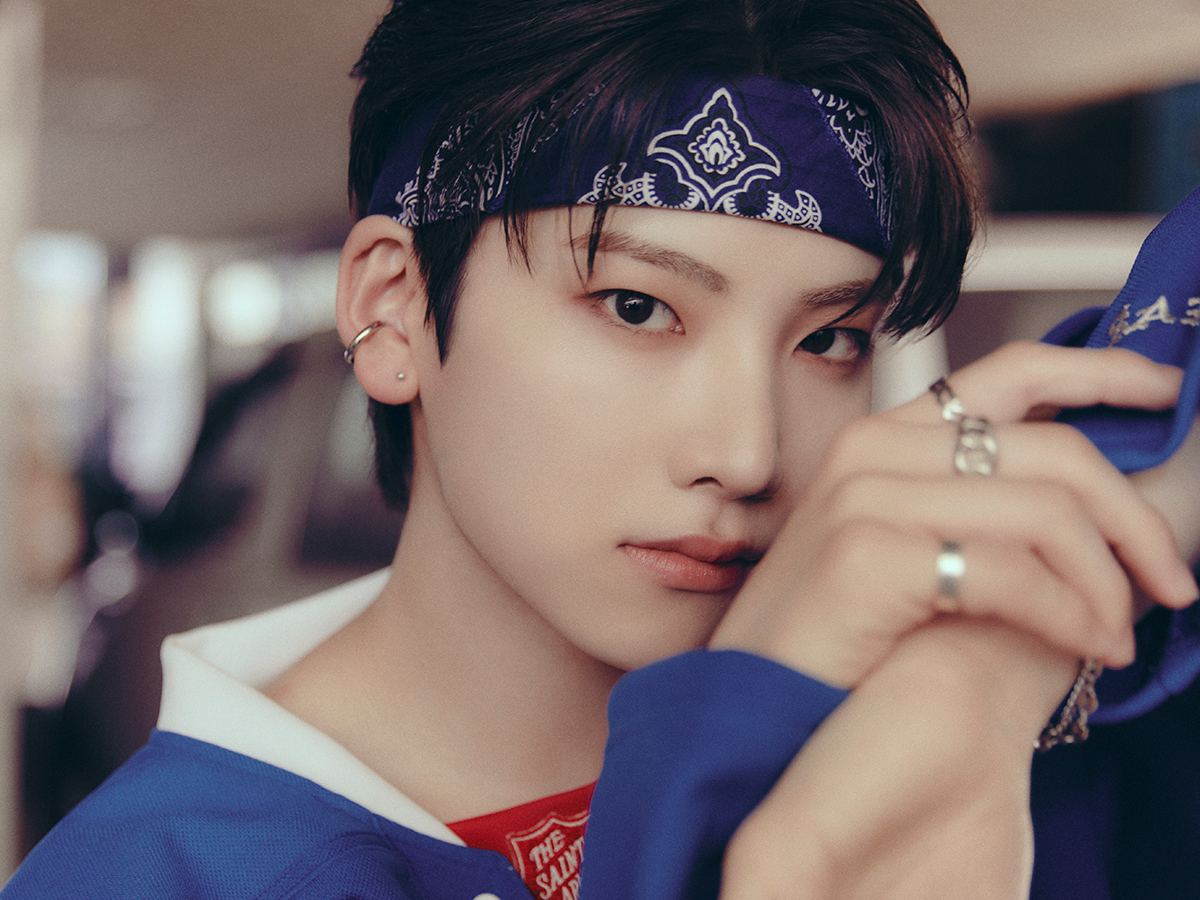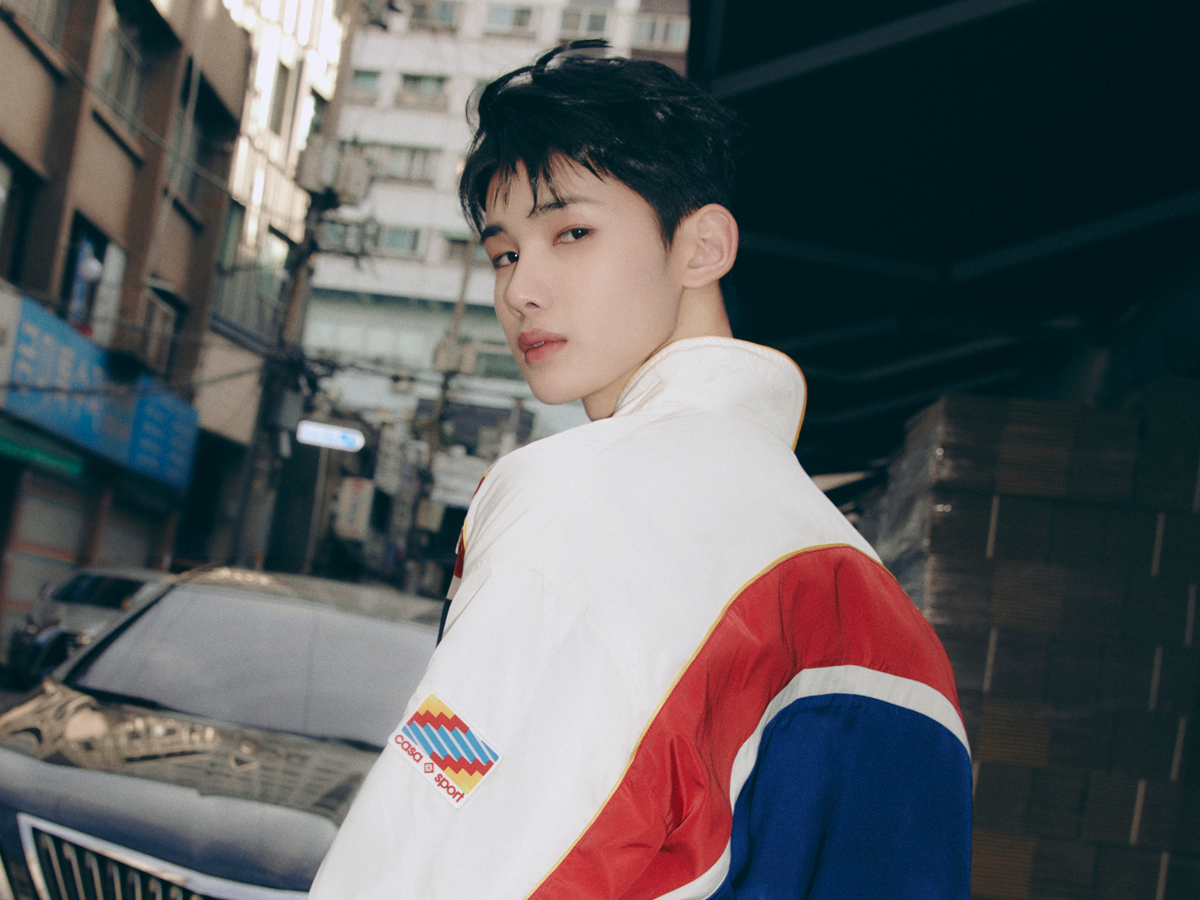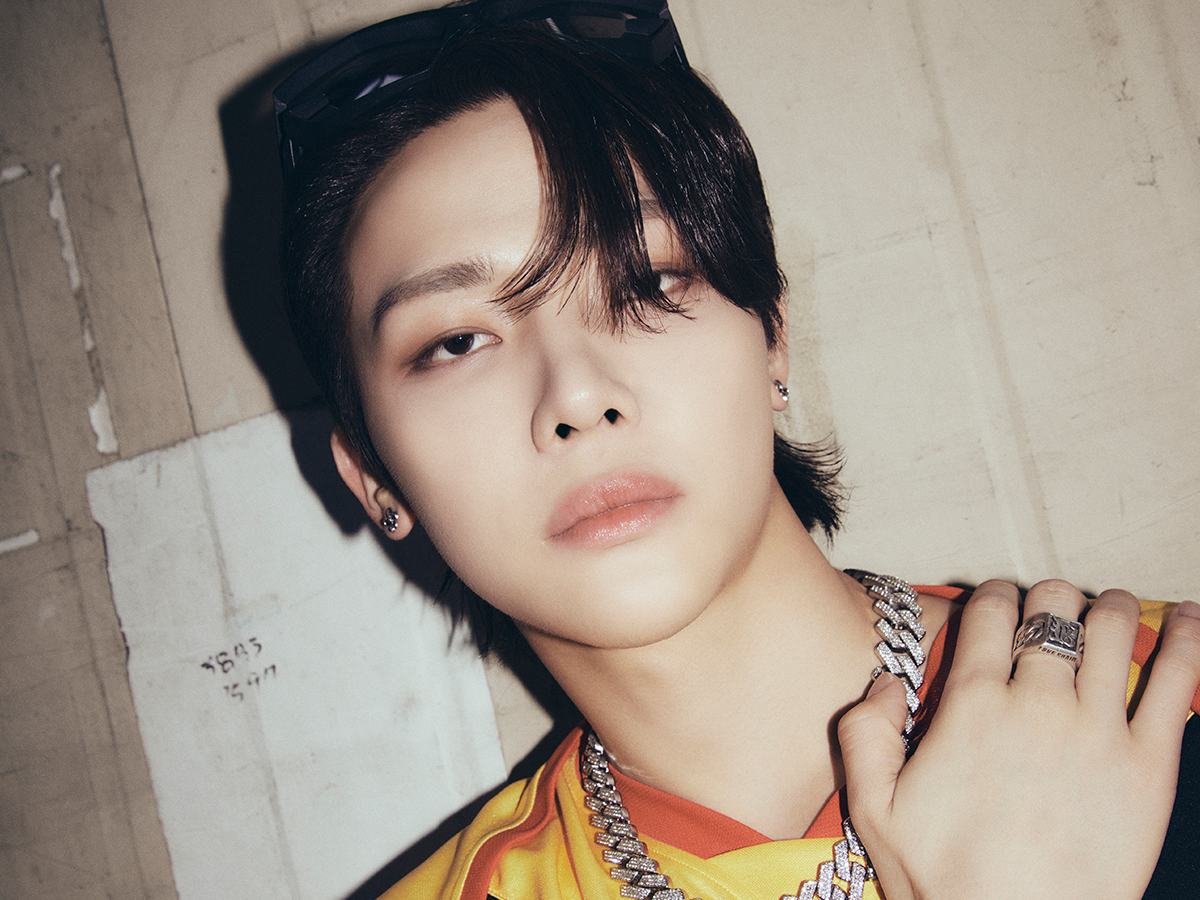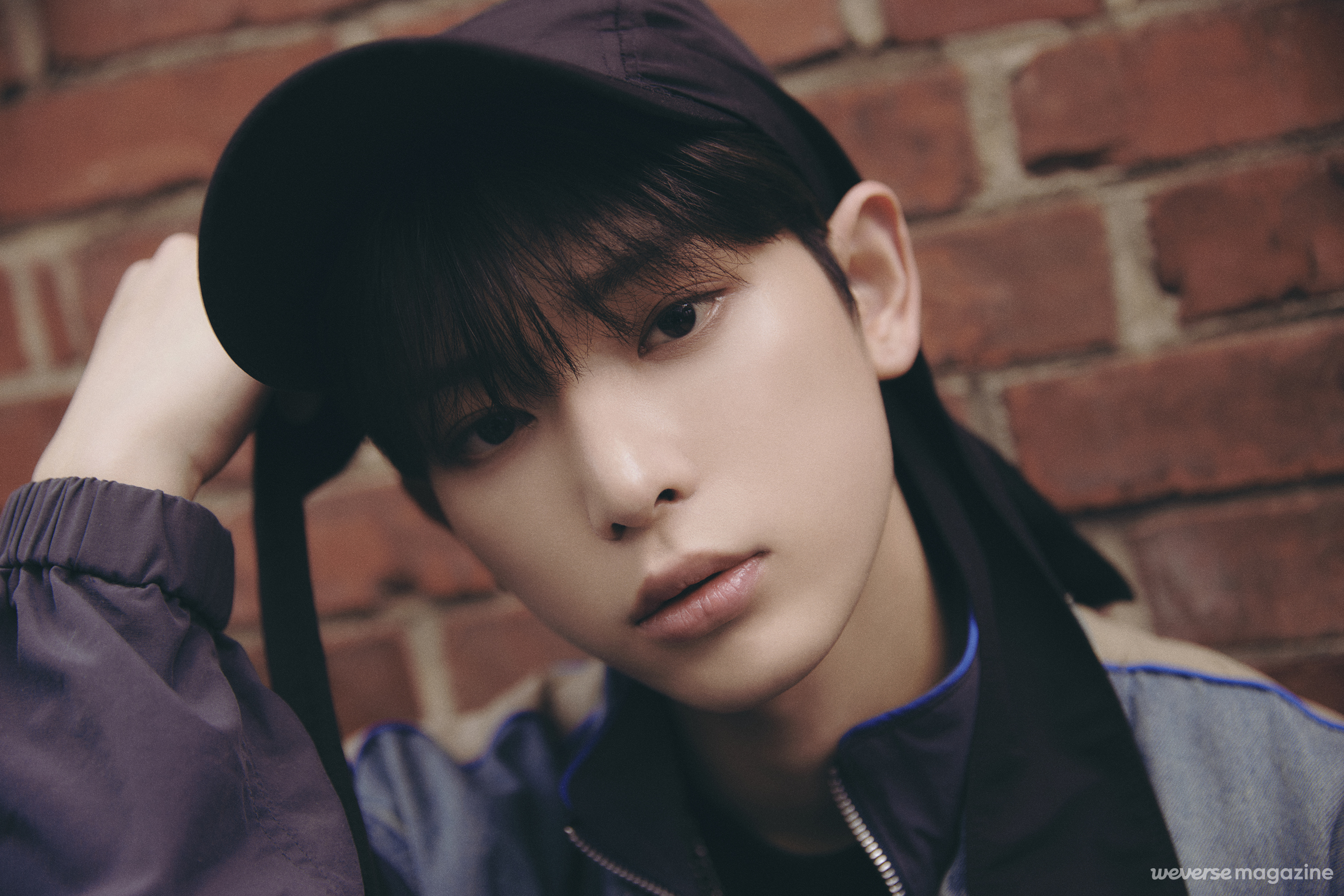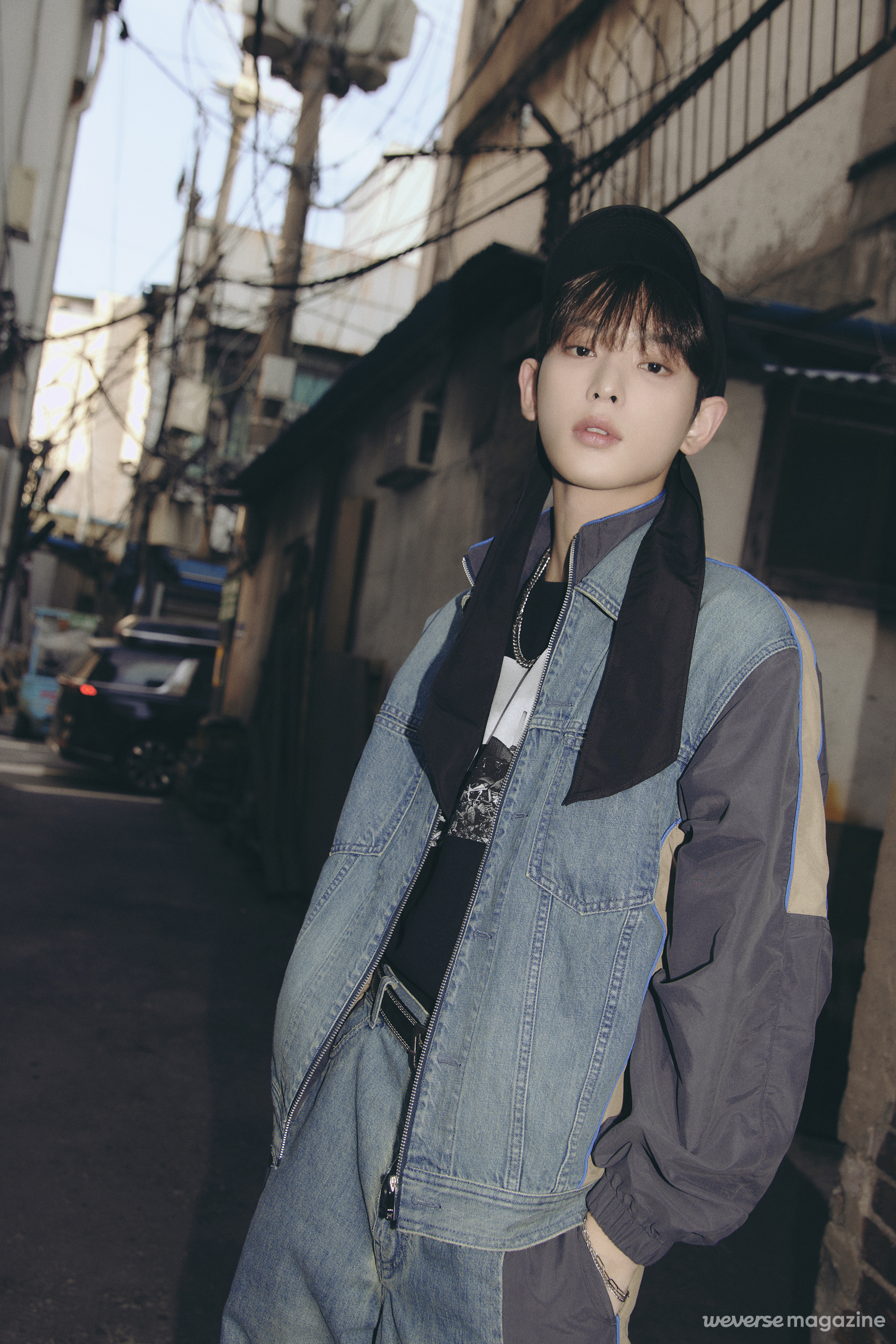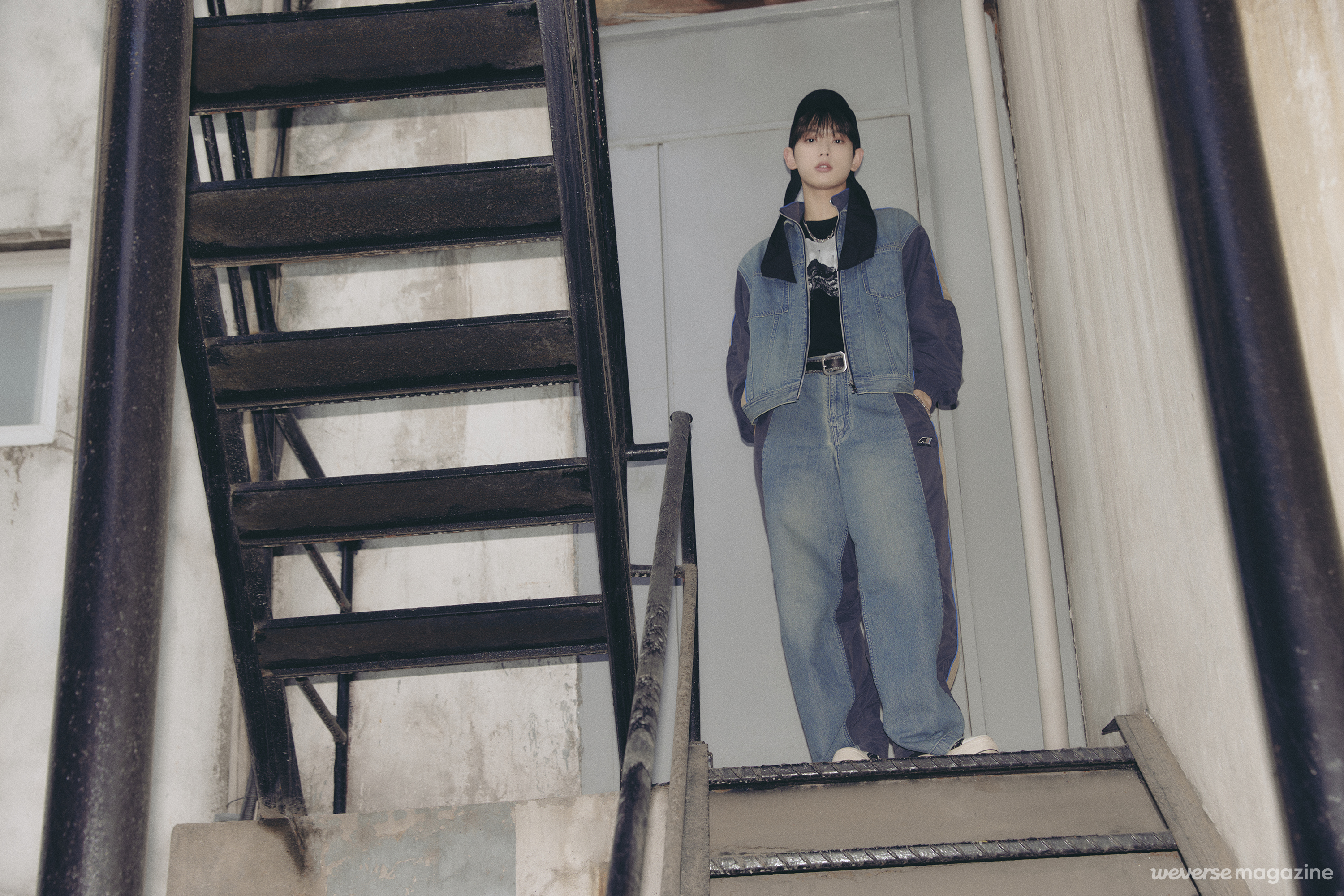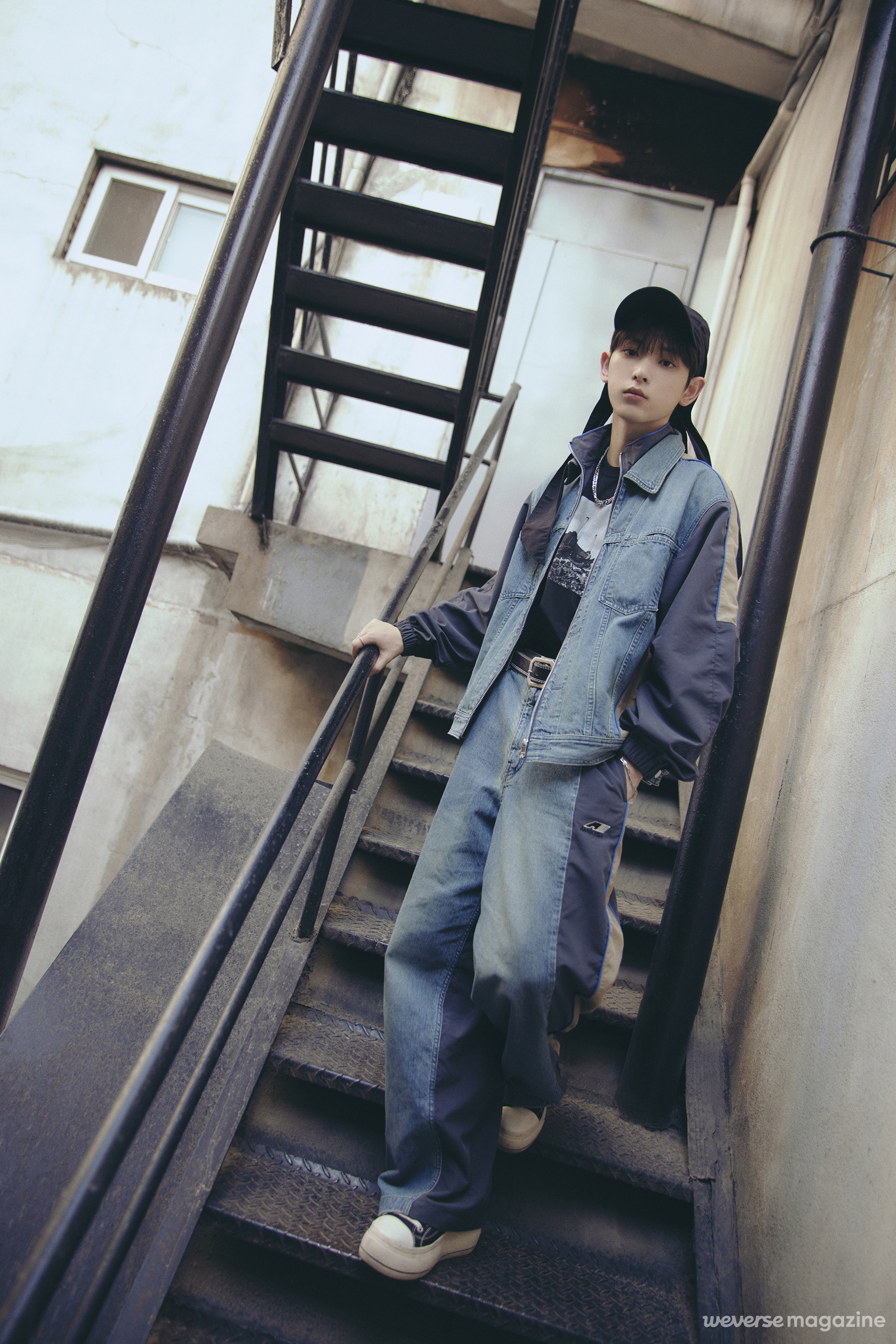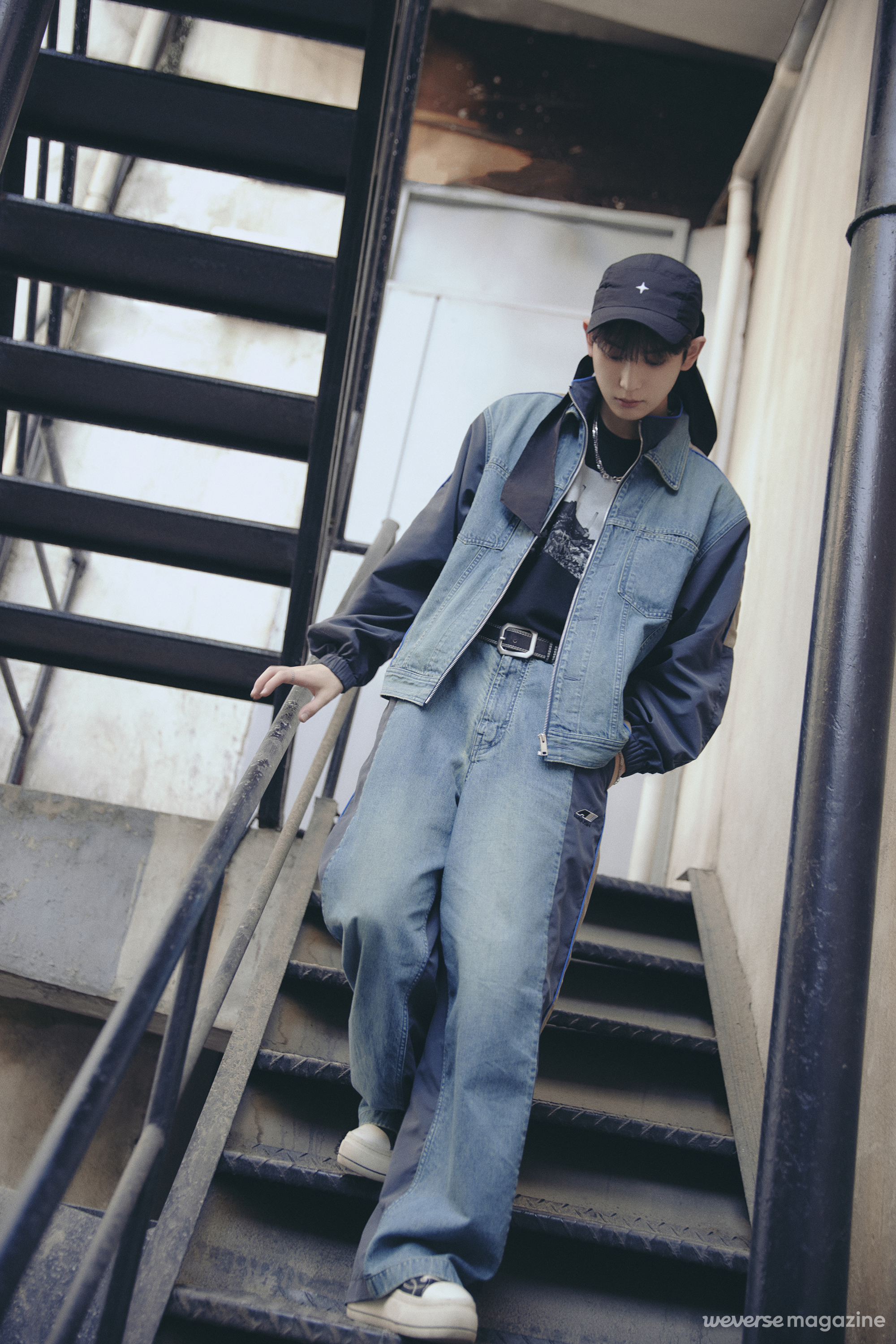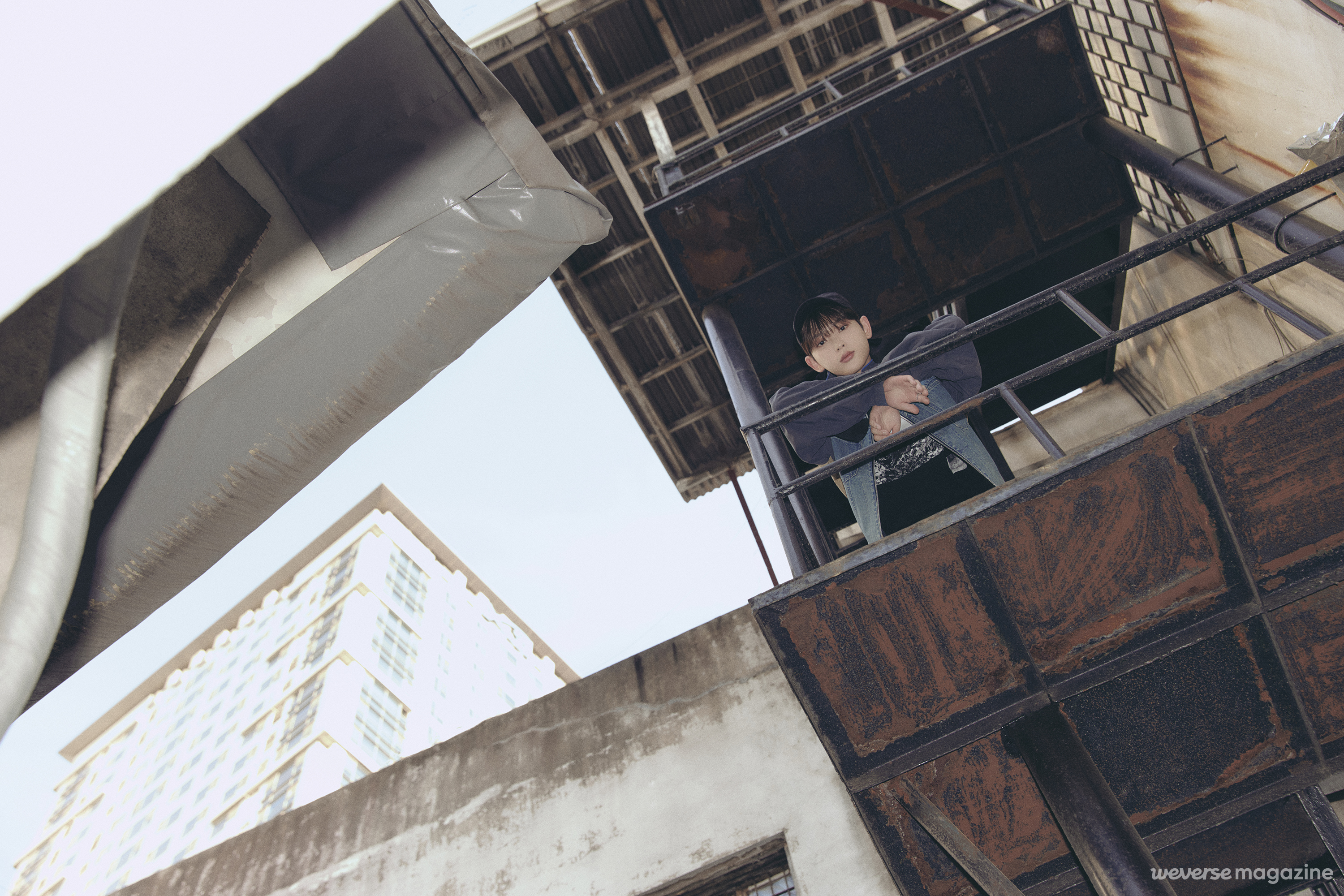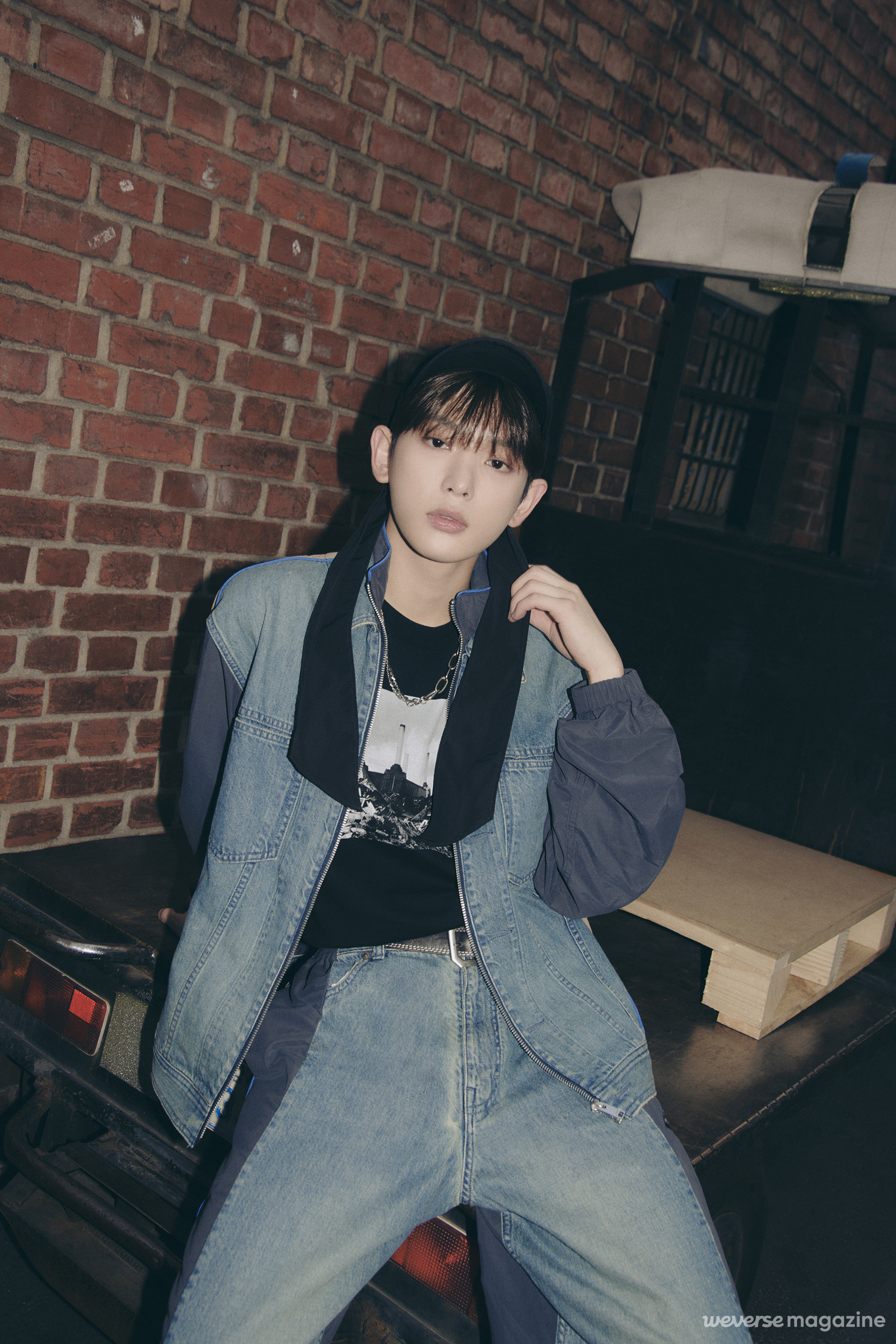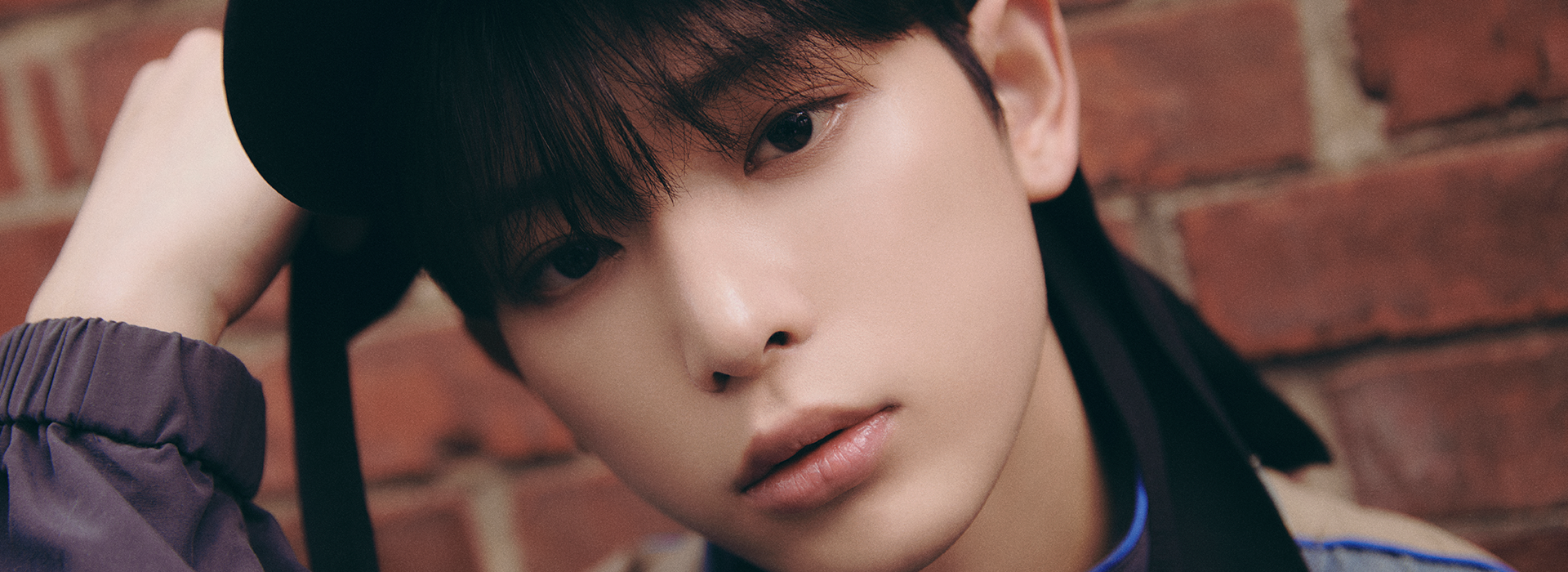
As HARUA speaks, he’s constantly describing his universe: the things and the people who surround him. The radiant 18-year-old continuously circles back to others throughout our conversation—like the Moon revolves around the Earth as it illuminates the night sky.
The day after the THIRSTY version of the concept clip for the new album went out, you posted pictures of where you filmed and a bicycle on Weverse. What were you looking for when you took the photos?
HARUA: When I was taking photos of the bike, I tried to keep any unnecessary things out of the frame so all the focus would be on the bike itself. There’s a grid when you look at the camera and I tried to keep my subject in the center of it. (laughs)
In &DAY you talked with NICHOLAS about how “level three” is the highest level a photographer can reach. I would say you’re a level three too. (laughs)
HARUA: Really? I have a feeling NICHOLAS would say the angle and balance could be a little better. (laughs) I learned how to take pictures from him. He takes a lot of pictures of me too.
You also mentioned that you’re looking to buy a camera but haven’t yet.
HARUA: I went to the store with NICHOLAS before when I wanted to buy a camera but there were so many different kinds of cameras and they all had different specs. I felt like I still needed to figure out what kind of photos I want to take and what kind of camera I would need for that, so I couldn’t really buy anything. (laughs) I’m the type of person who needs to be well equipped before he starts something. I thought I’d better buy something appropriate than not know what I’m getting and regret it later.
The last letter of your MBTI must be J [Judger]. (laughs)
HARUA: I’m definitely J when it comes to cameras. (laughs) I took an MBTI test online and got INFP one time and ISTJ another time. I can definitely agree with the I [introvert] part at least. (laughs) I think the rest of it changes depending on how I’m feeling.
It seems like you planned out your room too though. (laughs) You were on an episode of Venue101 on NHK and you saw this leaf and said, “I want this for my room.” Did you end up getting one?
HARUA: I did! I always wanted to have plants in my room. I grew up surrounded by nature so I’m used to going outside and playing by myself. But my schedule’s so busy now that I thought it would be hard to take care of a plant. So I bought a chic wooden clock, put plastic leaves around it and bought canvas paintings to hang on the wall instead.
Did decorating your room help you to learn more about your own tastes?
HARUA: I usually like to hide everything away or cover it up with curtains—so all you can see is the green from the plants. I want to decorate my room so that it feels welcoming and relaxing. I want to make it into the kind of place I can hang out by myself sometimes and just listen to music and relax.
You’re known among the others as being the cleanest and most organized one in the group.
HARUA: I liked anime and different artists when I was young, and I enjoyed collecting merch and toys and arranging them in a nice way or setting them up in a line. Trying to make things that express what I want to express forced me to be good at keeping tidy. And my mom’s a very organized person, so she’s had an influence on me too.
Now I’m curious what kind of student you were when you were younger.
HARUA: I was a good and shrewd student. And I always understood what was going on around me. I always listened to my teachers, paid attention in class and never fell asleep. (laughs) And I was a model student when it came to studying. I’m really good at memorization, and I enjoyed memorizing things in social studies like what happened in what country in what year. I’m still good at memorizing a schedule. I’m always telling the other members about what the next day’s schedule is like and what our upcoming deadlines are. (laughs)
You’re not all that talkative, but you’re always looking after the others. You always share funny stories too, like on “&TOUR with EJ” where you recalled how K hadn’t packed a single thing even the day before having to travel somewhere.
HARUA: I tend to pick up on what’s going on in other people’s lives subconsciously. That’s why I remember things like that story about K so well. I sense other people’s feelings and circumstances before my own, even if what I really want is to focus on myself.
It feels like the change in focus from “me” to “we” from your debut EP to this EP really describes the story of &TEAM. I’ve noticed the other members deliberately talking to you since you’re an introvert.
HARUA: You hit the nail on the head. (laughs) I guess the way we try and help each other as we come together as a group and get to know each other little by little naturally shows. We make a serious effort to understand each other. Like what kind of personality someone has and how they react to certain situations, and what we should do too.
Maybe that’s why, even though you were shy, you started to joke around a lot with the other members and just naturally grew closer with them. What sort of influence has working with the group had on you?
HARUA: It never occurred to me before how important together time is, but after I debuted, I realized how much I cherish being able to talk with the other members. I need alone time too, but if I take a walk by myself, I sometimes find myself feeling lonely and think, I’d like to go somewhere with the others. These days I cherish both my alone time and the time I spend together with them.
Teamwork is also critical when you perform “FIREWORK.” You only get the big picture if every single person has good timing, and there’s a lot of parts with very detailed movements that have to be synchronized.
HARUA: What we always say to each other is, Let’s put on a performance that comes across as amazing and that people can empathize with right away. That’s why we talk to each other so much during practice. We sometimes decide the details based on the lyrics, but when there’s a disagreement, we all take a look together and choose to take things in a direction that everyone agrees looks cool, and then we repeat that process.
There’s a number of moves in “Road Not Taken” that take a lot of skill to pull off, like EJ dragging you along or when you sing while lying back. How did you practice for those?
HARUA: There’s a video from Children’s Day where the older members put me in a blanket and swung me. That’s what it felt like when first practicing that—like a ride at a theme park. But we can make it look like I’m being dragged away, obviously. (laughs) So to capture that, I tried to think of it not as being dragged along but being guided by howls, since that’s what the lyrics for that part are about.
I was impressed by the way your expression at the very beginning of the first verse of “FIREWORK” is so natural and sets a clear tone for the whole song.
HARUA: An introduction should always be eye-catching. Rather than just dance with all my might, I thought it was really important to understand the whole vibe of the song and convey a feeling of relaxation through my facial expressions or eye contact, so that’s what I focused on practicing. I personally felt that while “FIREWORK” is a fast-paced song, it’s more about the loneliness and anxiety that comes from a fleeting and futile feeling than simply about being upbeat. Maybe I was able to express those emotions so easily because being so close to nature when I was young helped me to develop emotionally.
Many of the songs on the new album, like “The moon is beautiful” and “Blind Love,” have their own clear emotional story to tell that requires you to get into the right emotional headspace. What was it like recording those?
HARUA: Expressing emotion through the voice alone isn’t easy. I concentrated on the emotions that came to me naturally as I listened to the songs. Even for the challenges on &AUDITION - The Howling where we were only required to sing, I still found it easier to express myself by singing and dancing at the same time. So when I recorded the vocals for “Blind Love,” I tried moving around and making hand gestures to help me express myself. I also did a lot of practicing on expressing myself in detail by learning from music series like Leemujin Service.
You were told “you’re thinking too much” in the early episodes of &AUDITION, but you certainly learned how to express emotion well at some point.
HARUA: I practiced every detail of the choreography for “Under the skin,” so I just focused on the music and danced, trusting my body would reveal the details naturally, and that cleared my head. And I realized that brainwashing myself before I perform works for me. I love how JUNGWON from ENHYPEN performs, for example, so I’ll watch a close-up “fancam” of him before I go on stage and brainwash myself into believing I’m him. Then my thoughts all disappear and I feel like I’m cool. (laughs)
You really improved quickly on &AUDITION—hence your nickname, the growing rabbit. What was the driving force behind your growth?
HARUA: I need time to do things. K and NICHOLAS are really clever and get things done fast, but I found out that I need to repeat a process thoroughly and develop a proper understanding in order to improve myself. So I stayed behind in the practice studio till late at night to practice alone and learned at my own pace, even though it took a while.
It may have taken you a while to practice for your role on Dr. Chocolate too, but you put on a great performance despite not having any acting experience. I was especially surprised by the scene where you have a seizure.
HARUA: I practiced for that scene so much. (laughs) I kept the situation and the character in mind and I got a natural-looking take out of it. When I thought things like, What if I try reacting this way?, or, Is this how Andy would say it?, it only made things worse, so instead I got into the role by just telling myself, I’m a person like Andy with a bad medical condition but still trying my best.
Shooting went well, but you still told the film crew that you hoped you didn’t create too much trouble for them. Why was that?
HARUA: It was my first time on the set of a TV drama and I didn’t really know the order of procedures, so I didn’t know that delays are a normal part of shooting and worried I might have been the problem. I’ve always been conscious about not inconveniencing others, even when I was young. I helped my family by doing more work so it would be easier on them and tried to do my work without anyone’s help. Even when I was on &AUDITION, I wasn’t thinking much about whether I’d get to debut or not—I was more worried if everyone was okay and what they were all thinking.
When it was revealed on &AUDITION that everyone had to collectively get enough &BALLs to advance to the final round, you said you had to work hard not for your own sake but for the sake of the team.
HARUA: I guess that’s because I just intuitively empathize with other people’s feelings. For example, I thought about how it’s better for everyone if I got a lot of &BALLs, or if there’s four people and only three chairs, I’ll think, I’ll stand—I’m not as tired as them. So I didn’t used to share my concerns with other people either. Now that I’m with &TEAM I’m slowly learning that we can rely on each other and help each other out.
It shows how considerate you are whenever you talk to LUNÉ. You’re always talking about the situation on the ground when you’re filming and explaining your own thought process to LUNÉ in behind-the-scenes videos since they can’t be there themselves.
HARUA: One LUNÉ once called me “the perfect idol.” I was just saying what I wanted to say. Hearing that made me realize I have a switch inside me. I wasn’t even really aware of what I was doing. It’s just something I naturally end up doing for LUNÉ. Right now I only know Japanese and Korean but I’d like to be able to express my thanks on Weverse in a bunch of different languages, even if they’re just short sentences. I hope I can keep improving and show them a new side of me too.
You’ll be in Korea promoting for three weeks. Is there anything you’re looking forward to?
HARUA: I’ve seen a lot of artists seeing their fans on the way to work in the morning, so I’m looking forward to that. (laughs) I was so touched when we had a fan signing event in Korea and LUNÉ wrote what they wanted to say in Japanese on their palm and then carefully read it all. This promotion will give us a chance to meet all the LUNÉ who couldn’t come to Japan before, so I’m really looking forward to that, and I’m excited that I can express my thanks to even more people.
It seems like you value sharing your feelings with LUNÉ and them sharing their feelings with you very highly.
HARUA: LUNÉ writes letters and sends their thanks and love on Weverse in lots of different languages even though they don’t know me personally. For that reason, I think I should show my gratitude even more. I want to be closer with LUNÉ and be there to support them. I hope we can be a source of energy and strength for LUNÉ anytime they feel down or tired.
It’s nice that you care so much about others, but you still need time to yourself, especially since you’re an introvert. It’s amazing that you chose to be a public figure despite that.
HARUA: I first dreamed of becoming an artist because I thought the strength that they give people is really quite amazing. Seeing other artists always gave me a lot of courage. Even when I didn’t really feel like going to school, I could get through the day knowing I had a concert to see the next day. My biggest role models are Jung Kook from BTS and JUNGWON from ENHYPEN. They’re both amazing in their own unique ways. I’m still trying to figure out my talents and what makes me special but I hope someday I’ll be able to show LUNÉ what makes me unique.



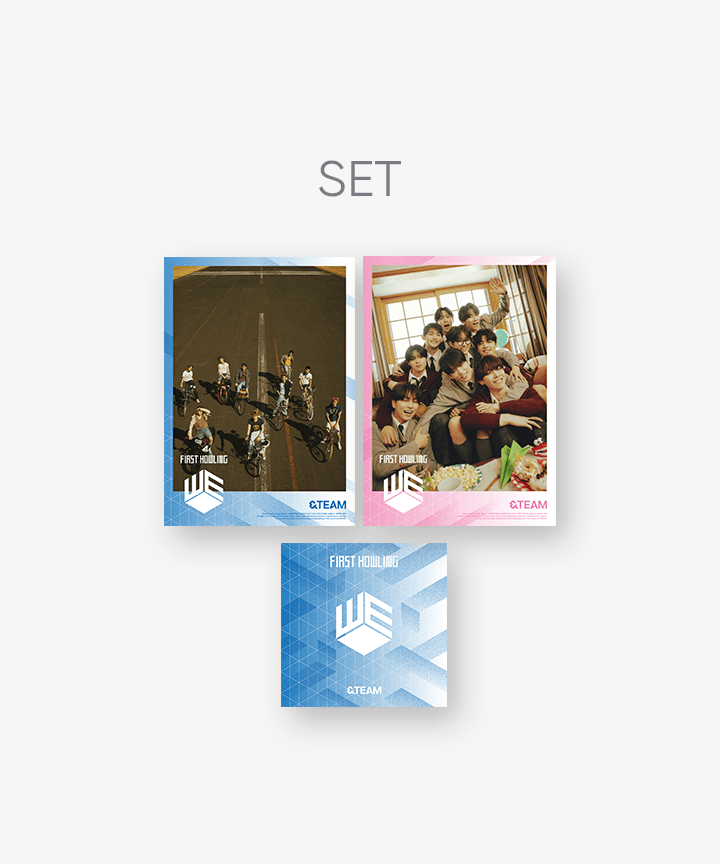
Unauthorized reproduction and distribution prohibited.
- FUMA: “I’ll never let this feeling fade”2023.06.26
